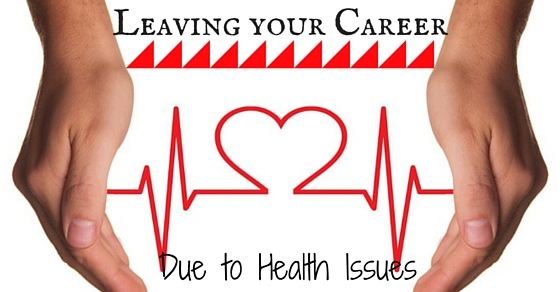Health is of primary concern for every individual. You can perform your duties with perfection only if you enjoy good health. However, there may be situations when you fall seriously ill. You may have to undergo long-term treatment for a complete recovery.
Health can be a great hindrance to your smooth career. There are many things you need to keep in mind when you leave your job due to health reasons. Here are some tips which you can follow to leave a company due to long standing health issues:

Leaving your Job Due to ill health:
1. What you should say about your medical leave:
One of the first things which you will need to do is explain the medical issue you are suffering from. Explain to your interviewer the problem you are facing and present the facts that made you go for a medical leave. Also, mention the time that you had taken as medical leave.
However, avoid getting into the specifics of your medical issue. Rather say that you are eager to resume work after having made a complete recovery.
However, keep in mind the fact that your prospective employers can weigh the consequences of hiring someone who has recovered from a serious illness. They may think about how it may affect their expenses on your health insurance.
Once the interview begins, try to stick to the main questions related to the type of work you have done so far. If you find that the interviewer asks questions related to your medical leave, explain the reason as to why you left your previous job. It will help to bring the conversation back on track.
2. Speak boldly about your strengths:
Using your communication skills and accomplishments in the past, you will be able to draw the focus of the interviewer from the medical leave. Try to highlight your achievements in your career so far.
What is going to matter the most is your work history, and whether you have handled your responsibilities with success or not? But don’t go out of your way to overpromise keeping in mind that you have just recovered from your illness. As a candidate, it is your responsibility to respond honestly whether you will be able to handle your tasks responsibly or not.
During the interview, what the interviewer is going to look into is your skills for the profile you have applied. Therefore, explain to the person what you have accomplished in the course of your career. The greater your credentials, the higher will be your chances of being successful in the interview.
3. Answer the interviewer’s objections and remove doubts:
If the interviewer has questions about your present health condition, you will need to acknowledge and respond to them. Also, make it a point to accept the reassurance. Take into consideration the employer’s point of view.
Apart from stakeholders, the company is also responsible for the safety of his staff and customers. All these responsibilities will come into play if you fall ill once again.
Tell him the exact health problem that you were facing which forced you to resign. Also, reassure the interviewer that you have recovered fully from the issue and are fit enough to resume duties. Since you will be resuming your career after a medical layoff, the condition of your health will be a major area he will look into.
4. Answer questions about leaving a job to take care of a family member:
When you are on leave because a family member is seriously ill, job hunting can be a big challenge. If your family member was unwell, be specific about the reason. In case the family member passed away, state that you did what you had to. You should try to be honest with your employer.
In case the employer asks any questions related to the health problem, share the details with him. Explain the treatment procedure that your family member or relative had to undergo. This will give the interviewer a clear idea about the situation you were facing which forced you to resign from your previous company.
5. Review your job application form well before submitting:
Check the employment application form well before submitting once you go for a face to face interview. Make it a point to answer the reason for your leaving the last job with clarity.
The interviewer should get to know the reason for your resignation and medical layoff. If the reasons which you have mentioned are not very clear, the interviewer may ask several questions which you aren’t prepared to answer.
Therefore, while writing the application, think clearly to mention the main reasons for your resignation.
6. Spend some time on your interview:
You may feel hesitant about your answers at the interview if you do not go well prepared. Therefore, make it a point to practice your responses to the interviewer a few days in advance. This will provide you with sufficient time to be ready with suitable responses.
Keep practicing until you reach a stage where you can give clear, truthful answers to any question that the interviewer can ask you. You can spend time doing this mock interview with one of your family members. It will help you in gaining confidence.
Consider the different questions that the interviewer may ask regarding the profile you are applying for. Think about the answers which you will give to those questions. Study well for the profile which you are applying for. If you know the responsibilities you would be handling, then it will be easier for you to provide satisfactory answers.
7. Don’t give too many details about your illness:
There is no point in sharing excessive details about the reason why you left your last job. Doing so would be wiser if the reason was due to your prolonged illness. Prospective employers are not likely to ask you questions related to your health condition.
Even if they happen to ask questions related to your medical condition, state that it was because of personal reasons. This will make sure that no further questions related to your health conditions come up and you don’t have to answer those questions in detail.
To make sure that the conversation doesn’t go in another way, discuss the major responsibilities you were assigned to in previous organizations.
Tell the interviewer about the different types of projects you handled. By doing so, you can ensure that the interviewer doesn’t ask too many questions related to your illness.
8. Point out on your ability to do the job you are applying for:
Explain to the interviewer that you left your previous job due to some personal issue which has been resolved. Elucidate on your ability to handle the job for which you have applied. This will give the prospective employer a clear understanding that you resigned because of some health related problems.
For example, you can say that ‘’I resigned from my last job because of a personal issue which has been resolved. I can handle all the functions for this specific job profile.’’ Stress on the major strengths which helped you be the best option for the post you are applying.
Apart from experience, communication skills and confidence are other factors that interviewers look for in a candidate. If you score highly in these aspects, you will have a high chance of being selected.
9. Answer all questions confidently:
Answer all those questions which may be related to your health with confidence and clarity. Explain to the interviewer your know-how of medical privacy law and employment practices.
The ones based on disability or presumption about your generic composition, which might lead to a certain medical condition, would be ideal to stress upon. This would be the ideal answer to any question if the interviewer probes you unnecessarily about the layoff period or resignation due to illness.
As a result, he won’t ask questions that are related to your period of medical layoff. Be firm, but polite at the same time. Interviewers often test the confidence level of candidates by asking questions which they may not be prepared to answer. The way you handle such questions will speak a lot about your ability to work in challenging conditions. So, try to maintain your composure.
10. Maintain your composure:
Be clear about anything that you are not required to disclose if the interviewer continues to probe you. However, try to maintain your calm. Don’t become indignant because of his questions.
It is your qualifications and skills which will matter the most during the interview. But there is a possibility that your know-how on equal rights based on medical conditions may be taken in the wrong way.
Therefore, try to maintain your composure throughout your conversation with the interviewer. Giving clear cut answers will help you create an instant impression on him.
But the most important deciding factor is whether you will be able to maintain your calm when asked with awkward questions. Speak whatever you feel with clarity, but at the same time ensure that you are polite to the interviewer. People who are usually able to maintain their calm in tough situations are highly valued by recruiting managers.







































